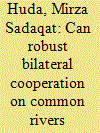|
|
|
Sort Order |
|
|
|
Items / Page
|
|
|
|
|
|
|
| Srl | Item |
| 1 |
ID:
120414


|
|
|
|
|
| Publication |
2013.
|
| Summary/Abstract |
The Himalayan river system, which is made up of the Ganges, Brahmaputra and Meghna rivers, has a combined drainage area that covers the countries of China, India, Nepal, Bhutan and Bangladesh. The basin of the Indus river, which originates in the Tibetan plateau, is the lifeline of regions in China, Pakistan, India and Afghanistan. The perception of the subcontinent being an India-centric region does not arise solely from the disparities in resources and power, but also from the geographic reality of all countries in the region sharing a border with India, and some of the most significant rivers passing through its territory. India, thus, stands in a unique position to initiate vigorous multilateral cooperation on water issues in the region. Despite this, the low level of integration, perennial conflicts, mistrust and misinformation that have plagued relations between South Asian countries have hindered regional cooperation on water security.
|
|
|
|
|
|
|
|
|
|
|
|
|
|
|
|
| 2 |
ID:
191571


|
|
|
|
|
| Summary/Abstract |
The geopolitical and geophysical realities of south Asia create a deep sense of paradox. On the one hand, territorial disputes and hyper-nationalism have resulted in some of the most militarized borders in the world. South Asia's international boundaries are subject to a range of conflicts, which includes high-level armed confrontations between India and Pakistan and low-level, yet deadly, incidents at the India–Bangladesh border. On the other hand, the region's ecology is inherently interlinked through shared rivers, glaciers and forests. South Asia's borders therefore present unique opportunities for environmental peacebuilding, as they are the epicentre of political conflicts as well as the source of transnational ecological connections. This article argues that grassroots processes of environmental peacebuilding can be used to build societal resistance to the rise of ethno-nationalistic populism in south Asia. Using interview data, the article tests concepts on pathways to environmental peacebuilding against underlying drivers of regional conflicts. The study suggests ways by which grassroots environmental initiatives on the Sundarbans forest between India and Bangladesh and the Thar desert between India and Pakistan can address the contemporary rise in nativist politics. The article contributes to existing literature by connecting theories on pathways to environmental peacebuilding to the ideational drivers of territorial and political conflicts. It adds to policy discussions by suggesting an ecological response to the contemporary rise of ethno-nationalistic populism in various regions of the world.
|
|
|
|
|
|
|
|
|
|
|
|
|
|
|
|
| 3 |
ID:
149900


|
|
|
|
|
| Summary/Abstract |
Political challenges are arguably the biggest constraint to the realization of regional energy projects in South Asia, an issue that has impeded cooperation despite the existence of substantial economic incentives. Although challenges such as technical difficulties, financial constraints and bureaucratic inefficiency are important, they are essentially subsidiary issues, the solutions to which are held hostage by often mentioned but rarely examined political impediments. While existing accounts of political obstacles in contemporary literature are relatively abstract, this paper draws on interviews with government officials, academics, representatives of regional institutions and officials of multilateral development banks in Bangladesh, Nepal, Pakistan and India to get insights into their experience of possibilities for and limitations to energy cooperation. By synthesizing the findings of interviews with relevant literature, this paper undertakes a systematic analysis of the political challenges to regional energy projects and provides a number of policy recommendations to overcome these impediments.
|
|
|
|
|
|
|
|
|
|
|
|
|
|
|
|
|
|
|
|
|